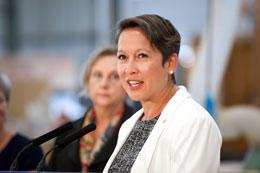Former youth in care thrive, defy the odds

By Melanie Mark
Hli Haykwhl Ẃii Xsgaak
Minister of Advanced Education, Skills and Training
In 2011, two youth in care organized to combat stereotypes and stigma about youth in care by celebrating the talents and achievements of their peers. For too many years, former youth in care were set up to fail. For too many years, their voices weren’t heard. The fact is, youth in care are overlooked for their potential. There is often a culture of systemic complacency that sets the bar of expectations too low for these young people.
Many youth in care face a lot of adversity. I grew up in the projects of East Vancouver with a single mom who struggled with mental health and addictions. I went to six high schools and was placed in government care. I advocated for my siblings while they were in care and eventually took over guardianship of my youngest brother, all while holding onto hope that one day my mom would sober up and leave her death sentence on the Downtown Eastside. I was groomed for hopelessness but managed to become the first in my family to graduate from high school, college and university. Later in life I learned that my grandparents attended residential school. Many things saved my life, but education was key.
I know first-hand the resiliency of former youth in care and their ambition for change.
After working in the Office of B.C.’s Representative for Children and Youth for almost a decade with Mary Ellen Turpel-Lafond, I couldn’t bear to hear any more tragedies. I entered politics in 2016 to disrupt the status quo and drive change for young people who need and deserve a fighting chance at success.
On July 18, 2017, Premier John Horgan appointed me as minister of advanced education, skills, and training. I became the first First Nations woman to serve in B.C.’s cabinet, I am Nisga’a Gitxsan, Cree and Ojibway. On Sept. 1, 2017, we announced the Provincial Tuition Waiver Program (PTWP) for former youth in care to attend any of the 25 public post-secondary institutions in B.C. and Native Education College, tuition-free. Within six weeks, our government delivered on a key mandate commitment and a promise to improve the educational success of former youth in care. It was simply the right thing to do and one of the proudest moments of my life.
Today, almost 1,300 former youth in care are walking through the doors of post-secondary education institutions around B.C. They’re attending some of the best colleges and universities in the country: places like Thompson Rivers University, Douglas College and the University of British Columbia. They’re writing a new chapter in their lives. They proudly tell me that they now have a new identity and sense of purpose.
Our government will continue to improve conditions for former youth in care to succeed once they leave care, the same way that many parents support their children past the age of 19. We’ve partnered with the United Way to help post-secondary students with living expenses through the Youth Futures Education Fund. My colleague, the Minister of Children and Family Development, Katrine Conroy, has also championed significant changes to the Agreements with Young Adults program to continue opening doors to opportunity.
It’s not a coincidence the minister responsible for the PTWP has lived experience as a former youth in care. This progressive public policy was driven by values and advocacy from people who believe in reconciliation in action. The PTWP is about investing in young people who deserve a chance to thrive.
Make no mistake, this program’s success relies on young people doing the heavy lifting to succeed in the classroom. They’re smart and ambitious. For the first time in my memory, we are hearing stories of success about former youth in care. They are studying to become teachers, business managers, nurses, web designers, early childhood educators and heavy-duty mechanics.
This provincial program was long overdue. We all know that it takes a village to raise a child to reach their full potential. This program is hitting the mark but there is more to do to empower former youth in care.
As we the 10th BC Child and Youth in Care Week, children and youth in care need to know that they are loved. We need to show up for them and support the organizations that help them overcome hurdles and support their aspirations. As the saying goes: A rising tide lifts all canoes.
When we lift up and empower children and youth in care, we are helping to heal the wounds and end the cycle that brought them into care in the first place. To all current and former youth in care: Keep defying all odds.






